
Parashat Va’etchanan (D’varim/Deuteronomy 3:23-7:11) 5782 B”H
A Question about the Torah (שאלה sh’eilah)
One day a Pharisee asked Messiah Yeshua (Jesus) this question:
“Rabbi, which is the greatest commandment in the Torah?” Matthew 22:36
He was asking what is known as a sh’eilah – a question regarding the Torah. This Pharisee happened to be a lawyer. As such, he was trying to set up an argument against our Savior, but our LORD All-Wise and All-Knowing answered perfectly:
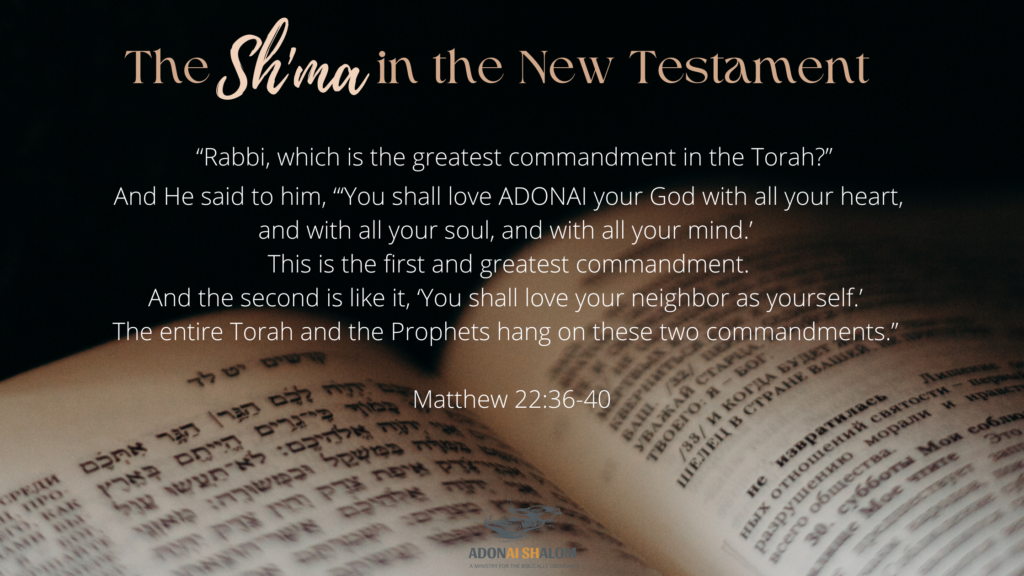
Yeshua quoted Scripture to answer the Pharisee’s question
Yeshua (Jesus) recited D’varim (Deuteronomy) 6:4-9 to respond to the Pharisee’s question about the Greatest Commandment. Messiah faithfully pointed back to the Scriptures that even the Pharisees knew so well. Rabbi Yeshua couldn’t be accused of “adding” or “inventing” a new faith.
He was pointing out that it was time to live the faith!
Because in Him, having a living faith would be possible because the Lord Yeshua alone was Perfect and He alone would fulfill Torah, giving us the possibility of new and eternal life if we will trust in Him.
The Greatest Commandment(s) are about love.
The Sh’ma
D’varim/Deuteronomy 6:4-9 is known in Judaism as the Sh’ma (also spelled out as Shema):

This text is recited daily by Jewish people around the world.
Sh’ma means “Hear.” “So faith comes from hearing, and hearing by the word of Messiah.” Romans 10:17
There are many Jewish people who know this passage very well, but have no idea it is the Greatest Commandment according to the Messiah! By reciting it with such passion and dedication, they are actually in agreement with the New Testament (Br’it Chadashah)! The testimony of generations proclaims the importance of Sh’ma, but not everyone has yet realized its fulfillment in Messiah Yeshua (Jesus Christ).
When we speak or sing the words of the Sh’ma, all of us can be reminded of several important truths that I believe can be listed out like note-taking . . .
Important Truths about the Greatest Commandment:
- The LORD: YHWH: ADONAI: He is.
- The LORD is our God. This is collective. He is the God of our nation and our communities if we will choose to follow Him.
- He is One. He has made Himself known as our Father, the Son, and the Holy Spirit. He is Elohim (a plural term in Hebrew), but He is also One. There are no other gods. We are not pluralists or polytheists. These verses establish monotheism.
- We are Israel. These verses speak to a Holy Nation, a set apart people. Whether native-born or grafted in, those who have chosen to follow Messiah are part of Israel. So these verses are true for you and me.
- We are to love the LORD our God. The Sh’ma points back to the First Commandment, which was given just one chapter earlier (D’varim/Deuteronomy 5). The Ten Words (aka “Ten Commandments”) cannot be lived out and obeyed without first loving their Author. Notice, the first four commandments require us to love God. The last six commandments require us to love our neighbor.
- These words are so important they are to remain on our heart. Proverbs 3:3 “Let kindness and truth never leave you— bind them around your neck, write them on the tablet of your heart.” Whatever is on our hearts will also be on our minds, and in this way we will have right thoughts and actions.
- Children are valued. The Sh’ma assumes there will be children who must be taught. We are responsible to care for them and to “diligently” teach our children. If we are to do this task, we ourselves must be prepared. Therefore, study is expected and each generation is tasked to continue to teach the next.
- We are to discuss the words of Scripture. We are to speak of these good things when we are in our homes but also when we are walking somewhere. We are to speak of the goodness of God when we are going to bed and when we wake up.
- Our faith is a part of us – it is to be bound to us. It should be known by your kindness and hospitality that your home is a house where disciples live. Your home should not house idols or worthless things. Your home is a reflection of your faith. Some of us have mezuzot מְזוּזוֹת(plural for mezuzah) on our doorposts – beautiful reminders that contain the words of Sh’ma in them.

Yeshua (Jesus) cited the Sh’ma as the Greatest Commandment!
Yeshua cited the Sh’ma as the Greatest Commandment.
We learn from His example that Jesus came not to abolish the Torah, but to fulfill it.
He shows us the law of love – that we must love God and love our neighbor and He did so by pointing back to the Scriptures and demonstrating it by His way of life.
We are challenged to live out the Greatest Commandments as well.
The Sh’ma in Revelation
Would you be surprised to know the Sh’ma‘s influence is even found all the way in the book of Revelation?
When Yochanan (John), the writer of Revelation, describes New Jerusalem, he describes the river of the water of life and the throne of God. Notice in verse Revelation 22:4, he writes that “His name shall be on their foreheads.” For those who had grown up with the Sh’ma, this would be a very obvious allusion to Deuteronomy 6.
They shall see His face, and His name shall be on their foreheads.
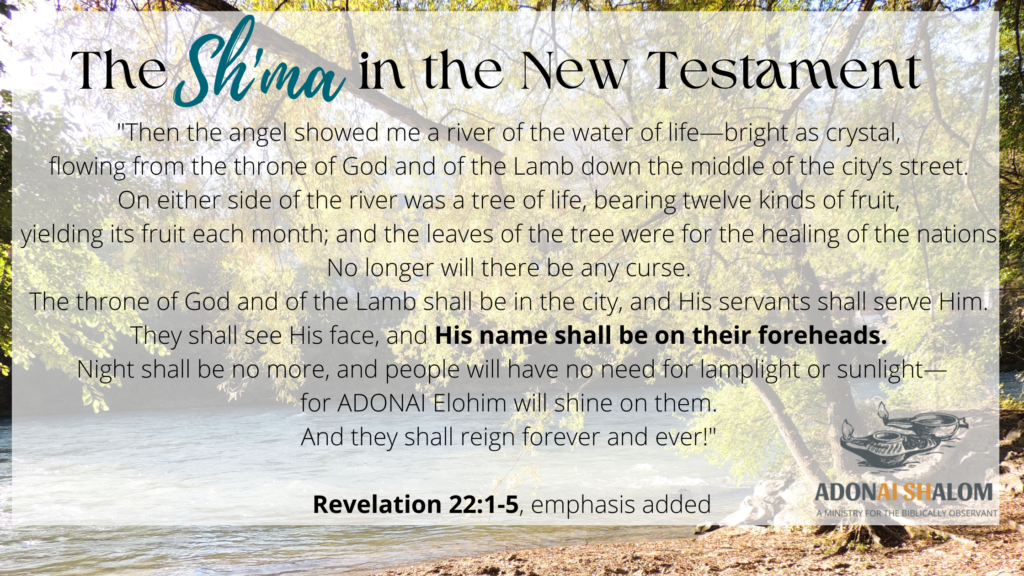
The Consistency and Continuity of Scripture
No other book contains so many cross-references and clear fulfillments of its words as the Bible.
When I first became a follower of Messiah, I was truly fascinated by this reality. For so many years, I had been taught lies that the Scriptures (even from their original form) contained errors and that they were not to be fully trusted.
When I discovered for myself, through the study of the original languages, that the Scriptures were most certainly trustworthy and that their testimony proves the Truth of our Savior’s love and sacrifice, I felt free. Scripture is consistent and what I love most is that it proves itself time and time again through God-inspired verses that reveal His Truth.
The Sh’ma being the Greatest Commandment proves the continuity of Scripture.
Let us look to Messiah Yeshua’s example
Messiah Yeshua taught us to know Scripture, believe it, and use it!
When questioned by a Pharisee about the Greatest Commandment or by the devil himself tempting him in the desert, our LORD always had Scripture to use as armor. His responses were right out of Scripture. This is why Scripture memorization is so important!
When we feel that our faith is being challenged, we must look to our Savior’s example. We, too, need the sword of the Spirit to rightly divide the Word of God and stay armed for any spiritual battle. We will not be able to live out the Greatest Commandment to love the LORD our God without dedication to Him and His Word.
“Be diligent to present yourself approved to God, a worker who does not need to be ashamed, rightly dividing the word of truth.” 2 Timothy 2:15, emphasis added
Scripture Memorization
It isn’t always easy to memorize Scripture, but I find that the more I read the Word of God, it naturally becomes etched in my memory. So read your Bible! Study the Word! And you will reap the benefits of being able to stand against the wiles of the devil and give praise to the Almighty One whose Word is so intricately designed and perfect.
Let us love God and love one another, and in so doing, we will fulfill the Greatest Commandments.
What is your favorite aspect about Scripture? Are you familiar with the Sh’ma? What tips can you give to others to help them memorize the Word of God? Leave a comment below! We’d love to hear from you!



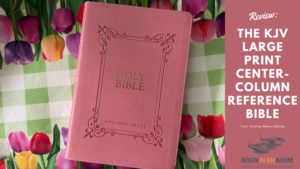
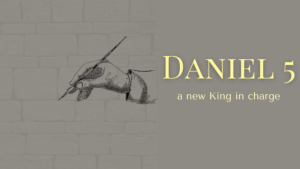


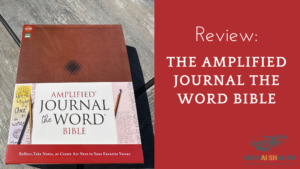
I sure do appreciate what you do! I find myself coming back here throughout the week to glean from your teachings. Thank you, friend! I’ll be coming back to this one!
That means so much to me! Blessings and Shalom!! 🙂
So interesting that the Sh’ma means “hear” and it makes me wonder if there is any connection when Jesus often said, “He who has ears, let him hear.” Now I want to research that! 🙂
oh yes that is definitely something that would be well worth the research!! POWERFUL!!
“We will not be able to live out the Greatest Commandment to love the LORD our God without dedication to Him and His Word.” This is well said and such an important message. It grieves me that so many Followers of Christ don’t understand how vital it is that we be in the Word. Thank you for your work, sister!
Oh yes how very much we need the Word! I often wonder if those who do not grasp this are truly His followers at all . . .
Wow es amazing toda la información que tu provees para ampliar mi conocimiento acerca de estos temas. Dios te bendiga.
Bendito sea HaShem, Dios Todopoderoso! Me alegro que esta información te haya sido útil y de bendición para ti el día de hoy. Muchas gracias por tu comentario! Shalom!